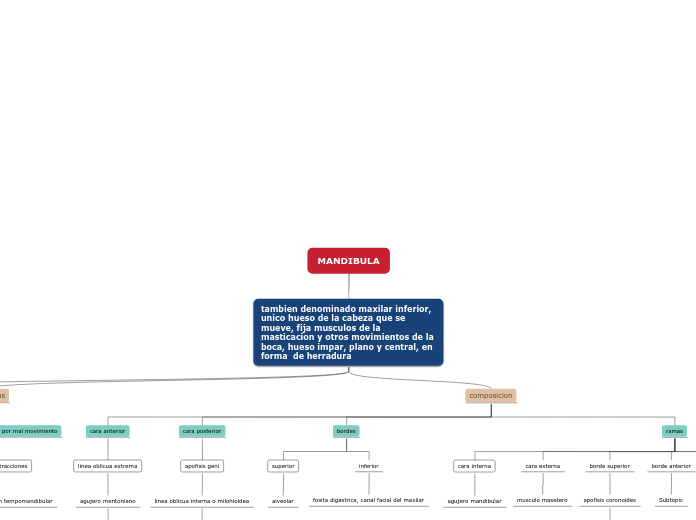realizată de ANDREA LEON 3 ani în urmă
234
MANDIBULA
El hueso denominado mandíbula, también conocido como maxilar inferior, es el único hueso móvil de la cabeza y desempeña un papel crucial en la masticación y en otros movimientos bucales.

realizată de ANDREA LEON 3 ani în urmă
234

Mai multe ca aceasta
Type in the name of the multiple-perspectives text.
Example: Bridge to Terabithia by Katherine Paterson
Identify an important issue from the text that is being presented from different angles. Type it in.
Example: Jesse's drawing talent.
Whose character does the third point of view belong to?
Type in his/her name.
Example: Mr. Aarons, Jesse's father.
borde inferior
angulo de la mandibula
borde posterior
tiene forma de S italica, es redondo y liso
borde anterior
Subtopic
borde superior
apofisis coronoides
condilo mandibular
cara externa
musculo masetero
cara interna
agujero mandibular
inferior
fosita digastrica, canal facial del maxilar
superior
alveolar
apofisis geni
linea oblicua interna o milohioidea
fosa sublingual
fosa submaxilar
What does the character think, say or do that suggests their perspective on the issue?
Type in a quote and try to maintain the citation format.
Example: 'He would like to show his drawings to his dad, but he didn't dare. (...) He'd thought his dad would be pleased. He wasn't. What are they teaching in that damn school? he had asked.' (Paterson, 2.8)
linea oblicua extrema
What kind of narration introduces the viewpoint?
Choose an answer:
agujero mentoniano
eminencia mentoniana
sinfisis mentoniana
Decide on the second point of view
Name the character (it can either be the main character or one of the supporting characters) whose point of view you are presenting.
Example: Miss Edmunds, Jesse's music teacher.
Type in a quote that points out the character's position about the issue.
Try to follow a citation format: author's name, chapter, and page.
Example: 'She said he was unusually talented, and she hoped he wouldn't let anything discourage him.' (Paterson, 2. 8)
dislocaciones y contracciones
How is the viewpoint introduced in the story?
Choose an answer:
transtornos de la articulacion tempomandibular
osteonecrosis cuando los huesos no reciben sangre
puede dar cancer
Decide on the first point of view you are going to present.
Type in the name of the character (it can either be the main character or one of the supporting characters) whose point of view belongs to.
Example: Jesse Oliver Aarons, Jr., the main character of the novel, a fifth-grader living in a rural Southern area.
Type in a relevant quote that highlights the character's point of view towards
tambien denominado maxilar inferior, unico hueso de la cabeza que se mueve, fija musculos de la masticacion y otros movimientos de la boca, hueso impar, plano y central, en forma de herradura.
Try following a citation format: author's name, chapter, and page.
Example: 'Jesse drew the way some people drank whiskey. (...) Lord, he loved to draw. (...) When he was in first grade, he told his father that he wanted to be an artist when he grew up.' (Paterson, 2. 7)
masticacion de alimentos
What type of narration introduces the viewpoint?
Choose an answer:
ayuda al habla
forma el piso de la boca, como una base